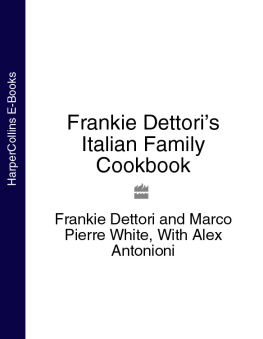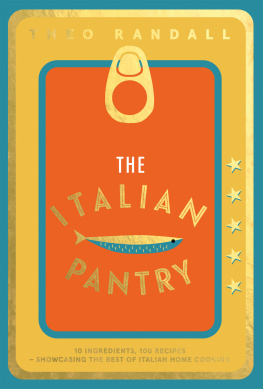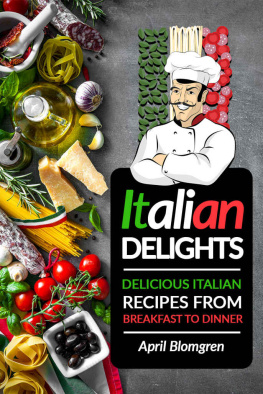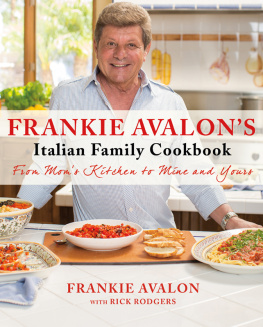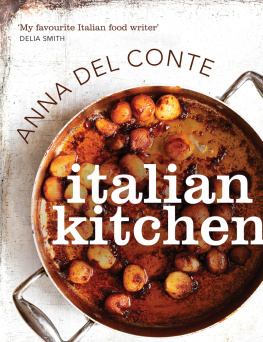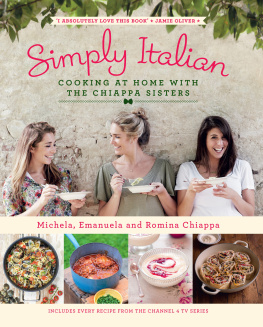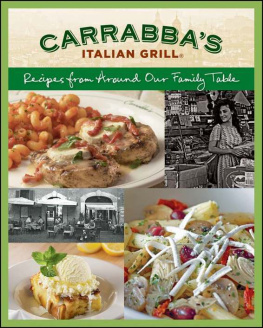For Catherine, Leo, Ella, Mia, Tallulah and Rocco with all my love.
And for Marco, for helping me to realize my lifelong ambition to be part of the restaurant business. What a partner to have!
Special thanks to Alex Antonioni for all her help picking our brains, and for having the courage to write down closely guarded family recipes. Wed never have got them onto paper without you!
We also couldnt have done without the help of Calum Watson whose patience and resilience is legendary. Thank you, to you, J.C. and the rest of the staff at Frankies, for making the photo shoots possible.
Thanks also to Efisio Lenti, Head Chef at Ziu Angelini, Porto Pino, Sardinia. Your ravioli is legendary!
Finally, many thanks to Peter Burrell, our long-term agent, business partner and friend. Its been a great ride so far, hasnt it?
CONTENTS

Frankie
In Italy, probably more than anywhere else in the world, people live to eat rather than eat to live. All Italians, every single one of them, are passionate about food. In English, if someone is really into food they get called a foodie, but in Italian there simply isnt a definitive word for this term. It would never occur to anyone to categorize someone as a foodie its a given.
With this kind of attitude youd think that Italy would be the obesity capital of the world. Yet in spite of being obsessed with food Italians are actually very fussy about what they put in their mouths. Italians simply dont eat processed foods laden with fat, sugar and salt. Instead, la vera cucina italiana is based upon local seasonal produce flavoured with fresh herbs and olive oil. Italians love their food but what they eat isnt unhealthy.
My earliest memories of food and cooking are by most standards fairly sophisticated. My mothers cooking, whilst simple in technique and not given to fussy sauces, was to say the least eclectic. This is because what she cooked on any given day depended on what fresh produce she found at her local market in Milan. This diversity was compounded by the three blissful months we spent in Sardinia with my grandparents every summer. Every day my Nonna would prepare a wonderful array of fresh local produce. This could be anything from line-caught eels and suckling pigs to homemade cheeses and wild boar. All the vegetables she served were fresh out of the ground from her orto (vegetable patch). There were tomatoes the size of a fist that tasted of tomato in a way that Ive never tasted since, figs so ripe they dripped with syrup, huge succulent peaches and the sweetest grapes Ive ever tasted. Best of all, my grandparents produced thirty litres of olive oil every year from their own trees. I can still remember the excitement of helping to pick the olives as a young boy. That, my friend, is living.
My point is that Italians dont go in for the chicken nugget version of kids food I ate what the adults ate and learned to love and respect the provenance of food from a very young age. Its not unusual in Italy for five- or six-year-old kids to start drinking a little wine mixed with water, especially if it is fattin casa (homemade), i.e. with Nonno treading the grapes. I think this contributes hugely to fact that Italian kids dont binge drink. They are so used to being around alcohol that it negates the mystery and disposes with the its naughty so Ill do it issue.
Im happy to say that my kids love their food and are not fussy, finicky eaters. Im sure this is because they eat proper food, not so called childrens food. Sure, Catherine tries to sneak in extra vegetables here and there but overall they do OK. My son Leo will try anything once. We gave him prawns the other day and he loved them. There was even a time when all he wanted for breakfast was fish hes clearly his fathers son! Its also important for me that my kids recognise their Italian roots, so we eat a lot of Italian in my house, balancing it out with the odd shepherds pie and bangers and mash, which I also love.
This book is all about bringing good food into your home. My mission, and yours if you choose to accept it (Ive always wanted to say that!), is to get families to sit down together to enjoy great food and, more importantly, each others company on a regular basis. Sunday lunch in my house is sacrosanct woe betide anyone who doesnt show. Its the one day of the week we all catch up on each others news, gossip and the good and not so good bits of the week that was.
My kitchen at home is completely open plan and is in fact an extension of the dining room and playroom, which in turn lead into the garden. When I cook at home there are always least half a dozen people milling around me (as well as assorted cats and dogs) playing, talking, tasting, laughing, bickering and, of course, opening the odd bottle of wine. When the food is ready everyone sits down together and I get a nice warm feeling in my bones, being surrounded by those I love.
As they say in Italy, La cosa pi importante e mangiar in famiglia, cos si capisce tutto di tutto, which roughly translated means, the most important thing in life is to eat together as family: only then can you comprehend whats really going on the lives of the people closest to you. I have a funny feeling that these wise words will prove invaluable when my kids are teenagers.
Frankie Dettari
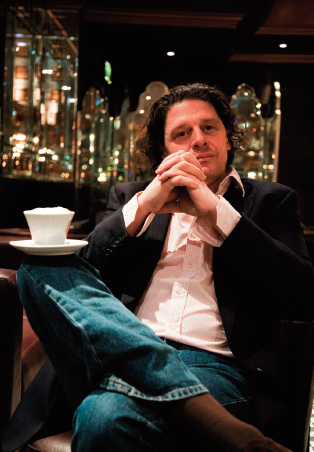
Marco
The greatest culinary influence in my life came from having an Italian mother who was a natural-born cook. Her family lived just outside Genoa where I used to spend my summer holidays as a little boy. My earliest food memories are of my mother picking me up from the school gates at midday to go home for lunch. I must have been about five years old. It was only ever the two of us and Im not sure why my elder brother didnt join us and instead stayed on for school dinners. Maybe she still regarded me as the baby or perhaps she had already spotted my interest in food. When we ate wed talk and giggle our way through lunch. I think the reason this had such a lasting impression on me is that those simple meals were always filled with happiness.
Mum cooked simple food intelligently and with great deal of attention to detail. She always used seasonal produce. In winter shed make hearty soups with root vegetables, pulses and a little rice or pasta with a sprinkling of Parmigiano. In summer wed have delicate broths studded with podded peas and lots fresh, soft herbs or perhaps a vegetable rice salad or simple spaghetti al burro (which remains to this day my favourite pasta). She steered clear of fussy food and heavy sauces. Sometimes lunch would be just a very ripe tomato with a little salt, olive oil and, perhaps, some bread or a piece of cheese. But even a simple snack like this was made with love and a great deal of care and thus still lingers in my memory. Her food philosophy was to buy the best quality that you can afford and to let the flavours speak for themselves.
I believe my mothers inherent understanding and appreciation of food is a major component in the DNA of most, if not all Italian women. They seem to posses an uncanny knowledge and love for cooking and its ability to nurture. Italians always adhere to the principle that a great meal is not about expensive ingredients. On the contrary, some of the best food in Italy stems from la cucina povera, the kitchen of the poor, which understands the importance of allowing Mother Nature to do her job as supplier of our groceries, meat and fish. All that is left for the cook to do is to present her produce in the purest and simplest way.

